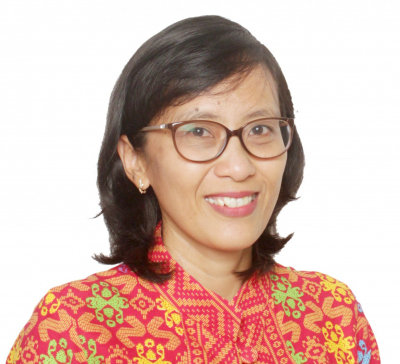- Graduate School GLOMAR
- PhD student members
- Lisa Fajar Indriana
Lisa Fajar Indriana
| Institution: | AWI Bremerhaven and ZMT Bremen |
| E-mail: | [Bitte aktivieren Sie Javascript] |
| Other webpage(s): | Lisa's ZMT web page |

PhD Project
Nursery and Integrated Multi trophic Aquaculture (IMTA) System in sea cucumber Holothuria scabra culture
Sea cucumbers are highly valued for their use in functional foods and pharmaceuticals. One such species, the sandfish (Holothuria scabra), commands a high price in the market, and its demand is on the rise. However, due to over-exploitation, its population has sharply declined, making aquaculture of sea cucumbers critical to their conservation and restoration, while also ensuring a steady market supply. Despite this, scaling up production faces significant obstacles in the nursery phase, juvenile release, and grow-out techniques implemented in monoculture and integrated multitrophic aquaculture (IMTA) systems.
Previous studies have shown that there is a lack of information on optimal methods for the nursery and grow-out of H. scabra, especially in Indonesia. Therefore, understanding the best-prepared feed composition and nutritional needs, nursery systems, and co-culture of H. scabra with other marine commodities are vital steps in the development of sustainable aquaculture. The objective of this project is to optimize the nursery system, including dietary components, and investigate the co-culture of H. scabra juveniles with mollusk, fish, and macroalgae using IMTA systems. The research components will involve developing a suitable diet for the early juvenile phase, improving the nursery system in ponds, and developing an IMTA system in semi-outdoor and ponds.
Thesis Committee
| Dr. Matthew James Slater | Alfred Wegener Institute, Helmholtz Centre for Polar and Marine Research (AWI), Bremerhaven |
| Dr. Andreas Kunzmann | Leibniz Centre for Tropical Marine Ecology (ZMT), Bremen |
| Dr. Vanessa Fuchs | Alfred Wegener Institute, Helmholtz Centre for Polar and Marine Research (AWI), Bremerhaven |
| Dr. Sebastian Ferse | Leibniz Centre for Tropical Marine Ecology (ZMT), Bremen |


